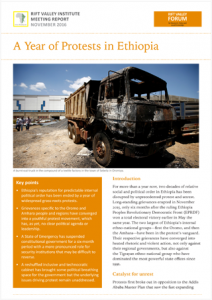For more than a year now, two decades of relative social and political order in Ethiopia has been disrupted by unprecedented protest and unrest. Long-standing grievances erupted in November 2015, only six months after the ruling Ethiopia Peoples Revolutionary Democratic Front (EPRDF) won a total electoral victory earlier in May the same year. The two largest of Ethiopia’s internal ethno-national groups—first the Oromo, and then the Amhara—have been in the protest’s vanguard. Their respective grievances have converged into heated rhetoric and violent action, not only against their regional governments, but also against the Tigrayan ethno-national group who have dominated the most powerful state offices since 1991.

Political Economy of Cash and Markets in Sudan
The research provides a snapshot of the war in Sudan in the period from February to April 2025. However, the war is dynamic, with political



